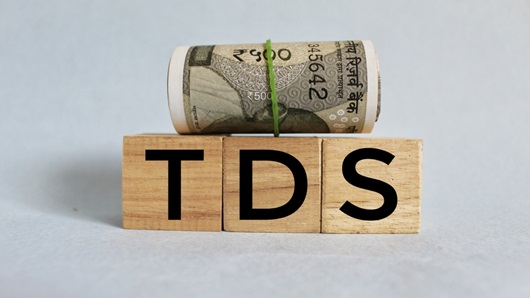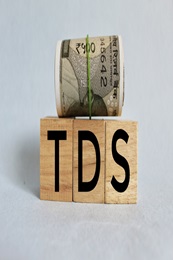Taxation on Fixed Deposit Interest Explained (FY 2025-26 Update)
April 15, 2025

The interest earned on Fixed Deposit is taxable as per the Income Tax Act, 1961. However, there's a gap when it comes to understanding how FD interest is taxed in India and how investors can save on their FD tax outgo.
In this article, we have simplified how taxation on fixed deposit interest works. This will help you understand how much of interest are you actually earning via your FD investments.
How is Tax and TDS on FD Interest Levied?
Interest income from fixed deposits is fully taxable and should be reported under the head 'Income from Other Sources' in your Income Tax Return. Your FD interest is taxed as per the income tax slab you fall into. To check your FD tax obligations, add your interest income to the total income, check the tax slab you fall into (for example: 30%) and calculate accordingly. You can use an online Income Tax Calculator to calculate the same.
Till FY 2024-25 (till March 2025), banks will deduct tax at source (TDS) at the time of crediting interest to your account if the interest income exceeds ₹40,000 for regular depositors and ₹50,000 for senior citizens. However, this threshold has been increased in Union Budget 2025-26. The new TDS exemption limit for Fixed Deposit is ₹50,000 for regular citizens and ₹1 lakh for senior citizens - this is applicable for FY 2025-26. The TDS applicable on FD interest is 10%, if you provide PAN card to the bank and 20% if you don't provide PAN card information to the bank.
It is important to note that the FD interest tax is deducted at the time of interest credit and not when the FD matures. For example, if you have a fixed deposit for 2 years, the bank will deduct TDS at the end of each year.
Understanding TDS on Fixed Deposit Interest
TDS or Tax Deducted at Source is a taxation mechanism through which tax is deducted from certain payments made to individuals. In the case of fixed deposits, the taxation on fixed deposit interest involves banks deducting TDS at a rate of 10% if the interest income exceeds ₹40,000 (₹50,000 for senior citizens). Please note that this TDS exemption on FD interest is applicable for FY 2024-25 (till March 2025). For FY 2025-26, the current TDS exemption limit has been hiked to ₹50,000 for regular citizens and ₹1 lakh for senior citizens.
For example, if you earn an FD interest of ₹60,000, the bank would deduct TDS of 10%. When filing your Income Tax Return, it is necessary to report the entire interest earned and claim the TDS deducted as a refund.
New TDS threshold limit for FDs (FY 2025-26):
| Interest Paid by | Senior Citizen (₹) | Other Citizens (₹) |
| Co-operative engaged in business | 1,00,000 | 50,000 |
| Co-operative engaged in the banking business | 1,00,000 | 50,000 |
| Primary Agricultural Credit Society | 1,00,000 | 50,000 |
| Co-operative Land Mortgage Bank | 1,00,000 | 50,000 |
| Co-operative Land Development Bank | 1,00,000 | 50,000 |
FD TDS Exemption Limit (FY 2024-25)
| Interest Paid by | Senior Citizen (₹) | Other Citizens (₹) |
| Co-operative engaged in business | 50,000 | 40,000 |
| Co-operative engaged in the banking business | 50,000 | 40,000 |
| Primary Agricultural Credit Society | 50,000 | 40,000 |
| Co-operative Land Mortgage Bank | 50,000 | 40,000 |
| Co-operative Land Development Bank | 50,000 | 40,000 |
It is important to note that if your total income is less than ₹4 lakh (for new tax regime, earlier the minimum tax slab was capped at ₹3 lakh) and ₹2.5 lakh (for old tax regime), no TDS will be deducted. To avoid TDS on your FD interest in case you don't fall under the minimum tax bracket, you can submit Form 15G or 15H (only for senior citizens aged 60 years and/or above) to the bank to claim interest income without TDS. You can view the details of TDS by checking your Form 26AS.
How to Calculate FD Interest Tax on Interest Income
To calculate taxation on fixed deposit interest, add the interest earnings from your FDs to your total income and determine your FD interest tax liability based on the applicable slab rates. The bank's TDS is adjusted against your final FD tax liability.
When is Tax on Interest Income Payable?
If there is a tax liability on adding interest income to your total income, it must be paid while filing your income tax return for the financial year. However, if the FD tax payable after including your interest income exceeds ₹10,000, you are liable to pay advance tax in quarterly instalments.
It's important not to wait until maturity to report your interest income, as the taxation on fixed deposit interest can result in accumulated interest pushing you into a higher tax bracket, leading to higher tax payments.
How to Ensure Zero TDS Deduction by the Bank
To ensure no TDS is deducted, you can submit Form 15G or 15H to the bank at the beginning of each financial year if your total income is not subject to tax (you don't fall under the minimum tax slab). This exempts you from TDS deduction on interest income.
Form 15H can only be submitted by senior citizens. Here are the details:
- If your age is 80 years or more: You can file Form 15H only if your taxable income is less than ₹5 lakh.
- If your age is 60 years or more but less than 80 years: You can file Form 15H if your taxable income is less than ₹3 lakh.
- If your age is below 60 years: You can file Form 15G only if your taxable income is below ₹4 lakh (for new tax regime) and ₹2.5 lakh (for old tax regime).
FD Interest Tax for Senior Citizens
FD interest is taxed as per the income tax slab. Senior citizens receiving interest income from FDs can avail TDS exemption up to ₹1 lakh per year (for FY 2025-26). Till March 2025, senior citizens can claim tax exemption up to ₹50,000. However, those falling below the taxable limit, can claim tax exemption by submitting Form 15H.
Final Thoughts
Understanding taxation on fixed deposit interest can help you plan your investments better. By calculating tax liability, and ensuring zero TDS deduction, you can make informed decisions about your FD investments.
Looking to grow your savings? Ujjivan SFB offers a wide range of fixed deposit products. Select the FD of your choice and take a step forward to your financial goals. Alternatively, you can browse through Ujjivan SFB product suite - our wide range of financial products are designed to make your financial life better.
FAQs
1. How is TDS on fixed deposit interest calculated?
The calculation of TDS on FD interest depends on the applicable rate and threshold amount. If your total interest income exceeds the threshold, the minimum TDS is deducted at a rate of 10%, provided if you can show PAN card. If you can't, the TDS applicable would be 20%.
2. Can I avoid TDS on fixed deposit interest?
Yes, you can avoid TDS by submitting Form 15G or 15H to the bank if your total income is below the taxable limit.
3. Is interest income from recurring deposits taxable?
Yes, interest income from recurring deposits is fully taxable according to your tax bracket.
4. What happens if I don't report my interest income?
Failing to report interest income can lead to an income tax notice and may result in higher tax payments when added in subsequent years.
5. Can I change my FD investment amount to avoid TDS?
Changing the FD investment amount will not affect TDS as it is based on the interest earned, not the investment amount.
6. Is there any tax exemption for senior citizens on FD interest?
Till March 2025, senior citizens can claim TDS exemption up to ₹50,000. From April 2025, the TDS exemption limit has been hiked to ₹1 lakh in a financial year on the FD interest income.
7. How can I calculate my total income including FD interest?
Add your FD interest income to your other sources of income and calculate tax liability based on the applicable slab rates.
8. Can I claim a refund for the excess TDS deducted on FD interest?
Yes, you can claim a refund while filing your income tax return if excess TDS has been deducted by the bank.
9. Is TDS deducted only once at maturity?
No, TDS is deducted annually at the time of crediting interest, not at maturity.
10. Can I avoid TDS if my overall income is less than ₹2.5 lakh?
Yes, no TDS is deducted if your total income is below the minimum taxable amount, which is ₹4 lakh (if you fall into new tax regime) and ₹2.5 lakh (if you fall into old tax regime), provided you submit Form 15G or 15H.
11. Are Non-Resident External (NRE) or Foreign Currency Non-Resident Account (FCNR) fixed deposits taxable?
No, NRE and FCNR fixed deposits are tax-free and do not attract TDS. However, the interest earned on NRO accounts are taxable.
Latest Blogs

Telangana Housing Board & KPHB Colony: A Guide to Affordable Urban Housing in Hyderabad
March 14, 2025
As Telangana continues its rapid urbanisation journey, two key housing entities—Telangana Housing Board (THB) and Kukatpally Housing Board Colony (KPHB)—have played critical roles in shaping the state's real estate ecosystem.

Does Checking CIBIL Score Frequently Lower Your Credit Points?
April 07, 2025
Imagine you're planning to apply for a home loan, a credit card, or even a car loan. Naturally, you want to ensure your CIBIL score is in good shape before proceeding.

Explained: Can NRIs Buy an Agricultural Land in India?
April 03, 2025
Real estate investment is often a top priority for Non-Resident Indians (NRIs) looking to retain strong financial ties to India.

How to Improve Your CIBIL Score from 600 to 750: A Step-by-Step Guide
April 02, 2025
Your CIBIL score is like your financial reputation—banks check it before approving loans or credit cards. If your score is hovering around 600, you might face difficulties in securing credit or may get loans with higher interest rates.

What Happens When You Leave Your Savings Account Unused?
April 01, 2025
Imagine waking up one day to find that your hard-earned money is locked away and inaccessible. Sounds stressful, right? This is precisely what happens when you leave your Savings Account inactive for too long.





